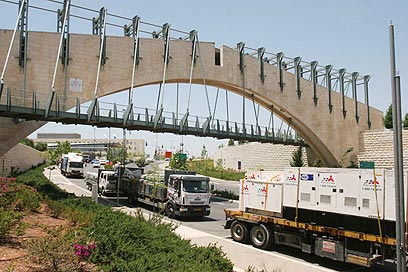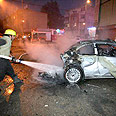One of the enduring symbols of the Second Lebanon War for many Israelis is the so-called 'tent city' built by businessman Arcady Gaydamak as a refugee camp for residents of the country's battered north.
Now Gaydamak is seeking to build a similar compound for Sderot families as Gaza terror groups increase their attacks on the city, killing a 32-year-old woman on Monday.
After the local municipality refused to authorize the set-up of a tent city in Jerusalem for Sderot evacuees, the billionaire decided to move his efforts north. He intends to create his 3,000-person tent city in Tel Aviv's Yarkon Park.
Gaydamak's staff members told Ynet that "although the Jerusalem municipality refused to accept Sderot residents, the evacuation plan will continue. (Tuesday night), we will begin building the tent city in Tel Aviv."
The Tel Aviv municipality said that a tent city would be approved only for 1,000 residents and was awaiting final approval from local police. Police forces, on their part, stated that they were unaware of a plan for a tent city in Tel Aviv.
Sources from Gaydamak's office stated that the section of Yarkon Park where they are interested in locating the tent city is privately owned and thus, they do not need authorization from anyone but the owners.
They hope to begin moving in Sderot residents to their temporary lodgings as early as Thursday.
The Sderot municipality, along with Gaydamak employees, will immediately begin logging residents interested in leaving the rocket-plagued city.
It appears that the Prime Minister's Office was involved in the road blocks to Gaydamak's tent city both in Tel Aviv and Jerusalem. Sources from the office said the government objected to such a plan because it "is well-equipped to deal with the growing need of residents to take a break (from the rocket threat).
"The Defense Ministry is able, at this time, to provide such solutions in an appropriate manner and degree," they said.
Snags in Jerusalem plan
Gaydamak originally wanted the tent city constructed in Jerusalem's Saker Garden and although municipal authorities and the Jerusalem police hadn't approved the elaborate plan yet Gaydamak's trucks arrived at Saker on Tuesday morning and prepared to unload.
Police quickly moved in to block the construction workers and municipal officials announced the city would not allow Gaydamak to use Saker Park because it lacked the necessary facilities required to accommodate so many people and because a nearby highway may endanger those staying in the park.
Instead the city offered Gaydamak the Tzipori vacation resort located just outside Jerusalem. The resort already has buildings suitable for housing, showers, toilets and a swimming pool and has already taken in refugees during the Second Lebanon War.

Gaydamak's trucks in Jerusalem on Tuesday (Photo: Gil Yohanan)
The municipality expressed disappointment Tuesday afternoon that Gaydamak did not agree to house residents in the resort.
"Gaydamak is trying to turn Sderot residents into beggars in the center of town, instead of offering them humane conditions of living as the municipality wants to give them," they said of his plan to build a tent city.
City officials said that if the wellbeing of Sderot's residents were truly Gaydamak's top priority he would accept their offer to house his project in Tzipori.
But Gaydamak's men said they received permission to begin construction on Monday night and therefore arrived at the site Tuesday morning with eight trucks laden with equipment. Only afterwards, they said, did they receive word that the city would not allow them to use the park.
The blame, the officials said, rests with Ra'anan Dinur, director-general of Prime Minister Ehud Olmert's office, who stepped in and changed the city's decision. The Jerusalem municipality adamantly denied the claim and said it had never authorized the construction of the tent city in Saker Park.
Gaydamak's office said that at present time the trucks continue to stand near Saker, where they will remain until a suitable solution is found, even if that should only happen after the Shavuot holiday.
"We don't want to set up anywhere else. We want to bring 3,000 people here and any other place can't hold more than 500," said a spokesman for Gaydamak.
The compound would consist of either large tents or prefabricated buildings housing dining halls, facilities, cinemas and more.
If he builds it… will they come?
But municipal bureaucracy aside, the biggest challenge Gaydamak may face in realizing his plan may come from Sderot's residents themselves, who despite the promised luxuries have so far refused to leave their city in the droves seen during the Second Lebanon War. Other than those who left to stay with relatives or in hotels out of Gaza's rocket range, most have opted to stay.
The Saker Garden, situated in the heart of Jerusalem, was chosen for several reasons but chiefly because of its proximity to the Knesset building. The venue would allow the tent city to become a protest arena against Prime Minister Ehud Olmert's government.
The decision to haul Sderot's resident to the capital may also stem from Gaydamak's efforts to tie himself to Jerusalem. Officials have hinted in the past that Gaydamak may one day even decide to run for mayor.
Gaydamak himself has stated in the past that he sees his future as linked with the city.
Officials within Gaydamak's office said that he initially tried to secure a military base to house the refugees, with his funding, but the Defense Ministry refused and so the tent city plan was conceived.
Ofter Petersburg, Yael Branovsky and Lilach Shoval contributed to this report

















